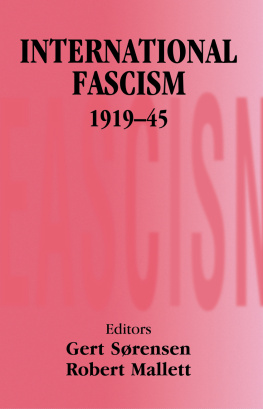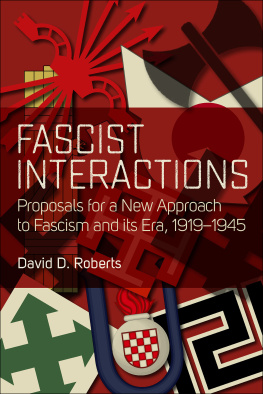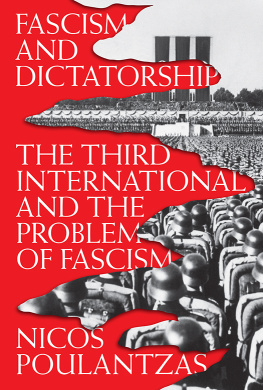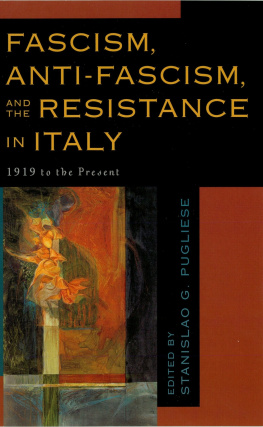INTERNATIONAL FASCISM 191945
Routledge Series: Totalitarian Movements and Political Religions
Series Editors: Michael Burleigh and Robert Mallett
ISSN: 1477-058X
This innovative new book series will scrutinise all attempts to totally refashion mankind and society, whether these hailed from the Left or the Right, which, unusually, will receive equal consideration. Although its primary focus will be on the authoritarian and totalitarian politics of the twentieth century, the series will also provide a forum for the wider discussion of the politics of faith and salvation in general, together with an examination of their inexorably catastrophic consequences. There are no chronological or geographical limitations to the books that may be included, and the series will include reprints of classic works and translations, as well as monographs and collections of essays.
Faith, Politics and Nazism: Selected Essays by Uriel Tal
With a Foreword by Saul Friedlander
Totalitarian Democracy and After: International Colloquium in Memory of Jakob L. Talmon
Yehoshua Arieli (ed.)
Contrasting the French and ltalian Communist Parties: Comrades and Culture
Cyrille Guiat
The Italian Road to Fascisnz
Emilio Gentile, translated by Robert Mallett
International Fascism, 191945
Gert Snrensen and Robert Mallett (eds.)
International Fascism 191945
Editors
Gert Srensen Robert Mallett
First published in 2002 in Great Britain by
Routledge
2 Park Square, Milton Park, Abingdon, Oxon, OX14 4RK
270 Madison Ave, New York NY 10016
Transferred to Digital Printing 2011
Copyright 0 2002 Routledge
Website: www.routledge.com
British Library Cataloguing in Publication Data
International fascism, 1919-1945
1.Fascism History 20th century
I.Sorensen, Gert, 1948-II.Mallett, Robert, 1961
320.53309042
ISBN 0-7146-5301-2 (cloth)
ISBN 0-7146-8262-4 (paper)
ISSN 1477-058X
Library of Congress Cataloging-in-Publication Data
International fascism, 1919-45 1 edited by Gert Ssrensen and Robert Mallett.
p. cm.
Includes bibliographical references and index.
ISBN 0-7146-5301-2 (hardcover)ISBN 0-7146-8262-4 (pbk.)
1. FascismHistory. 2. FascismItalyHistoriography. 3. World Id politics20th century. 4. EuropePolitics and government20th century. 5. Ideology. I. Ssrensen, Gert, 1948- 11. Mallett, Robert, 1961-
D726.5.148 2002
335.609041dc21
2002001716
This group of studies first appeared in a Special Issue on International Fascism, 191945 of Totalitarian Movements and Political Religions (ISSN 1469-0764) 2/3 (Winter 2001) published by Routledge.
All rights reserved No part of this publication may be reproduced, stored in or introduced into a retrieval system, or transmitted, in any form or by any means, electronic, mechanical, photocoying, recording or otherwise, without the prior written permission of the publisher of this book.
Publishers Note
The publisher has gone to great lengths to ensure the quality of this reprint but points out that some imperfections in the original may be apparent.
Contents
Robert Mallett |
ARTICLES |
Adam Holm |
Gert Ssrensen |
Lucio Ceva |
Morten Heiberg |
Steen Bo Frandsen |
John F. Pollard |
Franco Savarino |
Trine M. Kjeldahl |
Mogens Pelt |
ROBERT MALLETT
Fascismo was, at heart, a revolutionary creed as opposed to the mere maintainer of an existing social and political order, as some academics would have us believe. This much became all too evident when the Mussolini regime banned all political opposition and imposed dictatorial rule in 1926. Thereafter, the godfather of Fascism, largely unobstructed by monarchy, Church or political, military and economic lites, frequently repeated that he would transform Italy, and return the Italian people to the greatness of their Imperial Roman ancestors. No one could claim that Mussolini was not ambitious. Italy, at that time not a full-time member of the exclusive Great Powers club, lagged way behind its European neighbours the British and French. In economic terms Italy was much poorer, in military terms decidedly more backward, while socially the Italian people remained split between a comparatively affluent north and a desperately impoverished and unstable south. Yet Mussolinis movement, its strange pseudo-Roman cultural and artistic idioms and its increasingly successful endeavours to subvert the international political order, particularly after the rise of Hitler, did make its mark on Italy and the wider world. Even if Mussolini claimed that Fascism was not for export, this was patently not the case.
As this collection of articles shows, the Italian Fascist movement left an indelible imprint on the inter-war period. Trine Kjeldahl succintly examines the Mussolini regime as part of a broader analysis of Raymond Arons work on totalitarianism. For Kjeldahl, Arons contribution to his field was incontrovertible. Not only did he identify the religious dimension of the various inter-war regimes, but he was also able to establish the link between totalitarian ideology and revisionism in terms of international relations. In his excellent study of the Danish reactionary Right, Adam Holm argues that, while Denmark was never a country likely to endorse political extremism, the advent of Fascism in Italy sparked much furious debate within that country. The very existence of parliamentary democracy came under intense scrutiny, although the Danish radical Right fortunately believed that dictatorship suited the Latins but not the more sedate north Europeans. Denmark, thus, was spared revolutionary government, or at least until the Germans arrived in 1940. Morten Heibergs analysis of Mussolinis intervention in the Spanish Civil War and Franco Savarinos essay on Fascist policy toward Latin America, and Mexico in particular, emphasise the pro-active attempts of the regime to disseminate fascist ideological ideas. In turn, both demonstrate the limits of Mussolinis influence. Franco, a resilient character, rebuffed the senior dictators efforts to impose an Italian-style fascist regime on Spain. He would fight the Spanish war, and run Spain, his way. Across the Atlantic, in Mexico, Rome went to considerable lengths to win over native Italian migrs to the fascist ideal, and thus to help shift a turbulent Mexican society toward its own fascist revolution. Here, too, Mussolinis efforts fell on stony ground. Italian immigrants preferred integration into Mexican society to intimate bonds with the Fascist dictatorship, while the Mexican establishment itself resented Mussolinis crude attempts to impose the Roman cultural heritage on a country already enriched by native and Hispanic traditions. Mogens Pelt extends the analysis to Greece. Examining the Metaxas dictatorship in detail he shows how Greek fascism ironically clashed, for geopolitical reasons, with its Italian counterpart. In turn Metaxas identified closely with German National Socialism which, he believed, might eventually prevent Italian aggression against his country. This proved an ambitious idea, given the nature of ItalianGerman relations, and ultimately failed.










